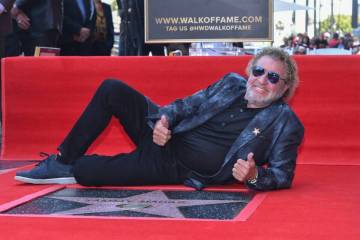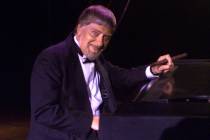Las Vegas revels in Bob Dylan’s Nobel Prize triumph
NEW YORK — Bob Dylan, Nobel laureate. In the book world’s equivalent of a Supreme Court ruling, the Nobel judges declared Thursday that Dylan is not just a rock star but a poet of the very highest order.
Dylan, 75, becomes the first musician in the 115-year history of the Nobel to win the prize in literature. He was honored for “having created new poetic expressions within the great American song tradition.”
Dylan rarely gives interviews, and a representative said the star had no comment. As usual, he let his music speak for him during a Thursday night concert at The Chelsea inside the Cosmopolitan of Las Vegas.
Dylan did not make any reference to the award, or anything else, from the stage. For much of the show he stood at a baby grand piano, wearing a loose-fitting gray suit, and also occasionally played a Fender electric and played harmonica at center stage.
Dylan received a half-dozen, full-house standing ovations during the 100-minute performance, which featured such classics as “Rainy Day Women #12 & 35,” “Highway 61 Revisited” and a bluesy take on “Blowin’ In the Wind.” He closed with Frank Sinatra’s, “Why Try to Change Me Now.” Eschewing a final bow, he instead gathered his five-piece band and merely stood facing the audience for several seconds.
The Nobel Prize is the ultimate ascension for the man who set off a lasting debate over whether lyrics, especially rock lyrics, can be regarded as art. Dylan, who gave the world “Like a Rolling Stone,” ”Blowin’ in the Wind” and dozens of other standards, now finds himself on a list that includes Samuel Beckett, Toni Morrison and T.S. Eliot, whom Dylan referred to in his epic song “Desolation Row.”
The startling announcement out of Stockholm was met with both euphoria and dismay.
Many fans already quote Dylan as if he were Shakespeare, there are entire college courses and scholarly volumes devoted to his songs, and judges work Dylan quotations into their legal opinions all the time, such as “The times they are a-changin” and “You don’t need a weatherman to know which way the wind blows.”
With this year’s Nobel announcement, many people, especially Americans, weren’t scratching their heads and asking “Who?!” the way they did after hearing the names of such winners as Patrick Modiano and J.M.G. Le Clézio.
Others, though, lamented a lost moment for books.
“An ill-conceived nostalgia award wrenched from the rancid prostates of senile, gibbering hippies,” wrote “Trainspotting” novelist Irvine Welsh. “I totally get the Nobel committee,” tweeted author Gary Shteyngart. “Reading books is hard.” The Vatican newspaper L’Osservatore Romano said some “real writers” probably aren’t pleased.
But several authors praised the news.
Nobel laureate Toni Morrison said in a statement that she was pleased and Dylan was “an impressive choice.” Salman Rushdie, who has written songs with U2’s Bono, tweeted that Dylan is “the brilliant inheritor of the bardic tradition. Great choice.” Perennial Nobel candidate Joyce Carol Oates tweeted “his haunting music & lyrics have always seemed, in the deepest sense, literary.”
During Thursday’s pre-show scene at The Cosmopolitan, the crowd was buzzing about Dylan’s honor.
Penn Jillette of the Rio headlining comedy-magic production Penn & Teller is one of Las Vegas’ foremost Dylan fans. He attended with a group that included his wife, Emily, and Teller.
“This is a big deal,” Penn said before the show. “It’s like, Shakespeare in his time was not high art. He was pop art, outside of high art. That has happened in our time, too, and Bob Dylan has been the example. So to have him honored in this way is a big deal.”
George Lyons was seated with a group of Dylan die-hards at The Cosmopolitan’s Chandelier bar before the concert.
“He is the greatest poet that America, and possibly the world, has ever seen,” the veteran Las Vegas radio personality said. “To be the first musician ever to win the Nobel Prize in literature proves it, I would say. Wouldn’t you? He’s won everything else.”
Erik Kabik, a Las Vegas-based rock photographer who has shot most legendary artists who have headlined here, has yet to be authorized to shoot Dylan (including Thursday’s show). But as an avid Dylan fan, Kabik was not complaining, holding a set of second-row-center tickets.
“With Dylan, it’s all about the music,” Kabik said. “His writing has influenced so many different types of people and transformed the way they view the world and themselves. I believe his works will go down as some of the greatest in all of American literature. … I think his influence on Steve Jobs and how he imagined Apple and its brand, his influence on the Beatles and so many others, including our president. I could go on and on.
“He’s the perfect recipient of this award.”
Howie Green, a Dylan devotee who works concert security at Brooklyn Bowl, said his favorite lyric is from Dylan’s 1964 song, “My Back Pages.” “Ah, but I was so much older then. I’m younger than that now.” Dylan was 23 when he recorded that song, in 1964.
“To have that kind of wisdom at the age is just incredible,” Green said.
Dylan’s award also was welcomed by a venerable literary organization, the Academy of American Poets.
“Bob Dylan receiving the Nobel Prize in literature acknowledges the importance of literature’s oral tradition, and the fact that literature and poetry exists in culture in multiple modes,” executive director Jennifer Benka said in a statement.
Critics can argue whether “Visions of Johanna” is as literary as “Waiting for Godot,” but Dylan’s stature among musicians is unchallenged. He is the most influential songwriter of his time, who brought a new depth, range and complexity to rock lyrics and freed Bruce Springsteen, Joni Mitchell and countless other artists to break out from the once-narrow boundaries of love and dance songs.
Dylan already was the only rock star to receive a Pulitzer Prize (an honorary one), and is, in fact, an author, too: He was nominated for a National Book Critics Circle prize for his memoir, “Chronicles: Volume One.”
He is the first American to win the Nobel literature prize since Morrison in 1993, and his award probably hurts the chances of such older American writers as Philip Roth and Don DeLillo, since the Nobel judges try to spread the honors around.
“Rather doubt Philip Roth and Don DeLillo wish they’d written “Mr. Tambourine Man” vs. AMERICAN PASTORAL and UNDERWORLD,” tweeted Roth biographer Blake Bailey, referring to acclaimed novels by Roth and DeLillo. “But sure, ok.”
Dylan’s life has been a hybrid of popular and literary influences. A native of Duluth, Minnesota, he worshipped Elvis Presley and James Dean as a boy, but also read voraciously and seemed to absorb virtually every style of American music.
His lyrics have referred to (and sometimes lifted from) the Bible, Civil War poetry and Herman Melville. He has contended that his classic “Blood on the Tracks” album was inspired by the stories of Anton Chekhov.
His songs can be snarling and accusatory (“Idiot Wind,” ”Positively 4th Street”); apocalyptic (“A Hard Rain’s A-Gonna Fall”); dense and hallucinatory (“Desolation Row”); tender and wistful (“Visions of Johanna”); bracingly topical (“Hurricane” and “Only a Pawn in Their Game”); and enigmatic and absurdist (“Stuck Inside of Mobile With the Memphis Blues Again”).
“Blowin’ in the Wind” was an instant protest anthem for the 1960s, yet sounded as if it had been handed down through the oral tradition from another century, with such lines as “How many times must the cannon balls fly before they’re forever banned?”
“Like a Rolling Stone,” his takedown of a rich and pampered young woman forced to fend for herself, was pronounced the greatest song of all time by Rolling Stone magazine. The six-minute recording from 1965 is regarded as a landmark that shattered the notion a hit song had to be three minutes.
At a 1965 news conference, he was asked whether he considered himself primarily a singer or a poet. Dylan wisecracked: “I think of myself more as a song-and-dance man.”
His career has been such a complicated pastiche of elusive, ever-changing styles that it took six actors — including Cate Blanchett — to portray him in the 2007 movie based on his life, “I’m Not There.”
He won an Oscar in 2001 for the song “Things Have Changed” and received a lifetime achievement award from the Academy of Recording Arts and Sciences in 1991.
Dylan is the most unorthodox Nobel literature prize winner since 1997, when the award went to Italian playwright Dario Fo, whose works some say also need to be performed to be fully appreciated. By a sad coincidence, Fo died Thursday at 90.
The literature award was the last of this year’s Nobel Prizes to be announced. The six awards will be handed out Dec. 10, the anniversary of prize founder Alfred Nobel’s death in 1896.
Review-Journal columnist John Katsilometes contributed to this report.





























